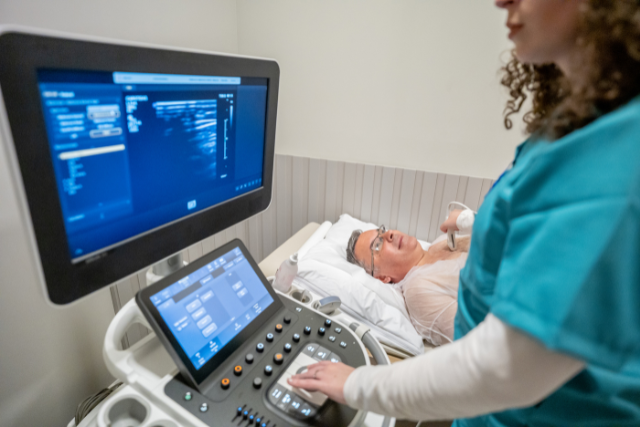Stress ECHO
Stress Echocardiography, often nicknamed Stress ECHO, is like an investigative mission for your heart. This unique test explores how your heart behaves when it’s put under stress. Now, by “stress,” I mean either through exercise or by using medications that mimic the effects of exercise on your heart.
Why your cardiologist has advised for Stress ECHO?
If you’ve been having chest pain, feeling out of breath, or your heart’s doing an impromptu salsa dance, your cardiologist might recommend this test. It’s a stellar way to diagnose heart disease, uncover the reasons behind chest discomfort, or even evaluate how well your ongoing treatment plan is working.

Turn Around Time for Reports
Good news! You won’t have to bite your nails for too long. Generally, the reports should be ready within a day or two after the test.
About the procedure
Preparing for the Test:
First off, before the test, there’s no need for extensive preparation. Just wear comfy clothing and avoid heavy meals before the procedure. If you’re on any medications, your cardiologist might advise whether you need to adjust or stop taking them before the test.
During the Test: There are two main ways this test is performed:
Exercise Stress ECHO:
You might be asked to walk or run on a treadmill, gradually increasing the speed or the incline. The goal is to get your heart rate up. As you exercise, a technician will perform an echocardiogram to visualize your heart’s structure and function.
Pharmacological Stress ECHO:
If you’re unable to exercise due to certain health conditions, the technician might use medications that mimic the effects of exercise on your heart. This could involve intravenous medication to elevate your heart rate and stress your heart while the echocardiogram is conducted.
The Echocardiogram Process
The echocardiogram involves using an ultrasound device that emits sound waves, capturing detailed images of your heart. A gel is applied to your chest, and then a transducer is moved around to produce these images. These images help your cardiologist assess how well your heart pumps blood and its overall function when at rest and under stress.
Who Performs the Test
This test is typically performed by a trained technician or a cardiologist. They’ll guide you through the process, monitor your vitals, and ensure the test is conducted safely and accurately.
Post-Test
After the test, you can usually resume your normal activities. Your cardiologist will analyze the images captured during the Stress ECHO and provide you with a comprehensive report to discuss the findings and potential next steps.
So, that’s a glimpse into how a Stress Echocardiography procedure rolls out—giving your heart a little workout to understand how it functions under pressure. If you’re due for this test, rest assured that you’ll be in good hands with a skilled team monitoring your heart’s story.
